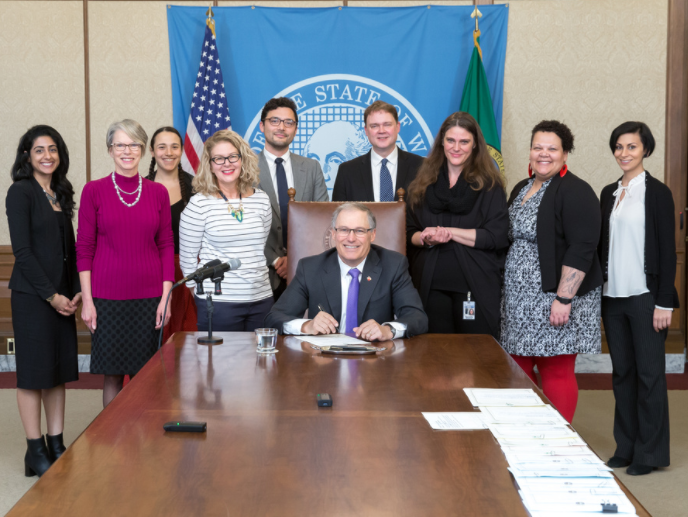
What a year! The historic 2018 Washington State legislative session is over and we are celebrating multiple monumental victories that will have an immeasurable positive impact for some of the most marginalized Washingtonians:
1. Immigrant survivors gain consistency in law enforcement response and increased access to legal services. HB 1022 will improve and standardize the statewide law enforcement response to immigrant crime victims, including domestic violence, sexual assault, and stalking survivors, improving the U and T visa certification process. The 2018 supplemental budget also includes over $750,000 in new money for statewide civil legal services, and an additional $1 million for a new immigrant legal defense fund.
2. Financial stability is enhanced by new workplace anti-discrimination protections and increased access to public benefits. HB 2661 makes it illegal for survivors of domestic violence, sexual assault, or stalking to be fired or face other retaliation from an employer related to their victimization, and requires employers to reasonably accommodate survivors’ safety needs. HB 1831 increases the asset limits used by the Department of Social and Health Services to determine eligibility for certain public benefits, including Temporary Aid to Needy Families (TANF) / WorkFirst, allowing more families to access this assistance. Additional funding in the supplemental budget also modestly increases the TANF benefit level for Washington families.
3. Important criminal-legal system reforms reduce disproportionate impacts to marginalized communities. HB 1783 makes long-overdue reforms to court-imposed fines and fees—Legal Financial Obligations (“LFOs”)—to increase victim access to restitution and ease the burden on returning citizens. HB 1298 The Washington Fair Chance Act (aka ‘Ban the Box’) limits employer inquiry into job applicants’ criminal records as an initial screening tool, mitigating some of the long-term harms of system-involvement for returning citizens, many of whom are survivors.
4. Major investments and new protections in Washington’s housing and homelessness response will be particularly vital for survivors, as domestic violence is a leading cause of homelessness. HB 2578 (“SOID”), the product of a decade of advocacy, prohibits landlords from discriminating against tenants and applicants because of a tenant’s source of income (such as housing vouchers or public assistance). HB 1570, secures and increases critical state funding (document recording fees) for homeless shelter and services. HB 2538 allows for exemptions from impact fees for new construction of emergency homeless shelters, including domestic violence shelters. Additionally, $107 million is included in the capital budget for the Housing Trust Fund to build and preserve affordable housing.
5. New firearms protections are added to state law to keep guns out of the hands of abusive partners and other dangerous persons. SB 6298 makes it illegal for persons convicted of domestic violence harassment to purchase or possess firearms. HB 2519 closes a firearm access loophole by conforming protocols regarding concealed pistol licenses to existing law on restricting firearms in cases of domestic violence, sexual assault, and where there is an Extreme Risk Protection Order.
6. Survivor privacy is increased with the passage of SB 6408 which shores up protections in the state Public Records Act designed to prevent body-worn camera footage in domestic violence and sexual assault cases from being disclosed to the public.
To all of the survivors, advocates, and allies who lead us, stand with us, and support us, we thank you! These victories are the result of years of work and we are incredibly grateful to Grace Huang who lead our policy team for 15 years before becoming the Policy Director at the Asian Pacific Institute on Gender-Based Violence in 2016. Thank you Grace! Thank you also to the work and leadership of our allies at the Northwest Immigrant Rights Project, Legal Voice, ACLU of Washington, Washington Low Income Housing Alliance, Washington Statewide Poverty Action Network, and Washington Alliance for Gun Responsibility.